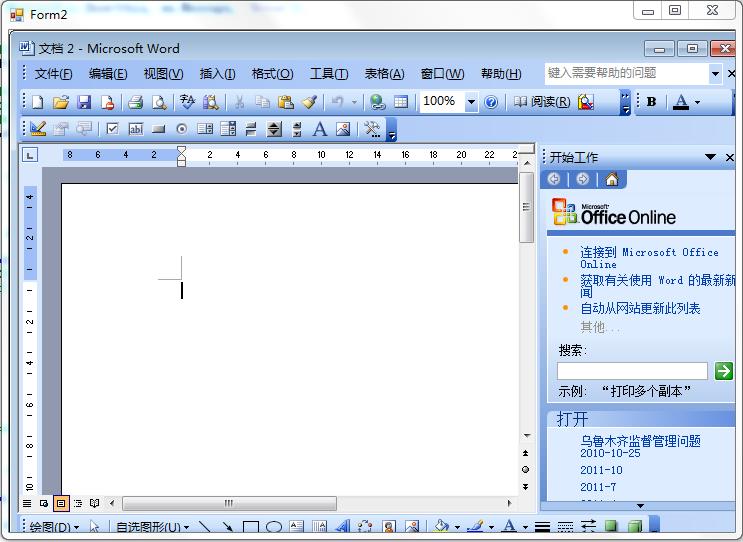C#的WinForm中嵌入.exe文件
Posted
tags:
篇首语:本文由小常识网(cha138.com)小编为大家整理,主要介绍了C#的WinForm中嵌入.exe文件相关的知识,希望对你有一定的参考价值。
我想在WinForm中加载一个.exe的可执行文件,但是我想让他嵌入一个控件中显示,而不是新打开一个窗口来显示exe文件,请问应该怎么实现这个功能呢?
这个函数setparent函数原型:HWND SetParent(HWND hWndChild,HWND hWndNewParent); 参数: hWndChild:子窗口句柄。 hWndNewParent:新的父窗口句柄。如果该参数是NULL,则桌面窗口就成为新的父窗口。在WindowsNT5.0中,如果参数为HWND_MESSAGE,则子窗口成为消息窗口。
-------------------
你在c#里面调用就是了,父窗口句柄设置为你的那个窗口,子窗口句柄就是你说的你那个EXE文件运行后的窗口的句柄。 参考技术A 大哥,服了你,感觉你问的问题好怪!求解! 参考技术B 试试能不能在一个面板中加载呢?追问
怎么在面板中加载啊?
追答不好意思,这个不知道了,还没试过
参考技术C 显示exe文件?什么意思?追问就是把exe文件打开的意思。。是另一个form的可执行程序
C#将exe运行程序嵌入到自己的winform窗体中
以下例子是将Word打开,然后将它嵌入到winform窗体中,效果如下图:
C将exe运行程序嵌入到自己的winform窗体中 - kingmax_res - iSport
注意:该方法只适用于com的exe(如word,Excel之类),.net的编的exe就不能用这用方法嵌入到窗体中。

using System;
using System.Collections.Generic;
using System.ComponentModel;
using System.Data;
using System.Drawing;
using System.Text;
using System.Windows.Forms;
using System.Diagnostics;
using System.Runtime.InteropServices;
namespace WindowsTest
{
public partial class Form2 : Form
{
Process process = null;
IntPtr appWin;
private string exeName = "";
[DllImport("user32.dll", EntryPoint = "GetWindowThreadProcessId", SetLastError = true,
CharSet = CharSet.Unicode, ExactSpelling = true,
CallingConvention = CallingConvention.StdCall)]
private static extern long GetWindowThreadProcessId(long hWnd, long lpdwProcessId);
[DllImport("user32.dll", SetLastError = true)]
private static extern IntPtr FindWindow(string lpClassName, string lpWindowName);
[DllImport("user32.dll", SetLastError = true)]
private static extern long SetParent(IntPtr hWndChild, IntPtr hWndNewParent);
[DllImport("user32.dll", EntryPoint = "GetWindowLongA", SetLastError = true)]
private static extern long GetWindowLong(IntPtr hwnd, int nIndex);
[DllImport("user32.dll", EntryPoint = "SetWindowLongA", SetLastError = true)]
private static extern long SetWindowLong(IntPtr hwnd, int nIndex, long dwNewLong);
//private static extern int SetWindowLong(IntPtr hWnd, int nIndex, IntPtr dwNewLong);
[DllImport("user32.dll", SetLastError = true)]
private static extern long SetWindowPos(IntPtr hwnd, long hWndInsertAfter, long x, long y, long cx, long cy, long wFlags);
[DllImport("user32.dll", SetLastError = true)]
private static extern bool MoveWindow(IntPtr hwnd, int x, int y, int cx, int cy, bool repaint);
[DllImport("user32.dll", EntryPoint = "PostMessageA", SetLastError = true)]
private static extern bool PostMessage(IntPtr hwnd, uint Msg, long wParam, long lParam);
private const int SWP_NOOWNERZORDER = 0x200;
private const int SWP_NOREDRAW = 0x8;
private const int SWP_NOZORDER = 0x4;
private const int SWP_SHOWWINDOW = 0x0040;
private const int WS_EX_MDICHILD = 0x40;
private const int SWP_FRAMECHANGED = 0x20;
private const int SWP_NOACTIVATE = 0x10;
private const int SWP_ASYNCWINDOWPOS = 0x4000;
private const int SWP_NOMOVE = 0x2;
private const int SWP_NOSIZE = 0x1;
private const int GWL_STYLE = (-16);
private const int WS_VISIBLE = 0x10000000;
private const int WM_CLOSE = 0x10;
private const int WS_CHILD = 0x40000000;
public string ExeName
{
get
{
return exeName;
}
set
{
exeName = value;
}
}
public Form2()
{
InitializeComponent();
}
private void button1_Click(object sender, EventArgs e)
{
this.exeName = @"D:\Program Files\Microsoft Office\OFFICE11\WINWORD.exe";
try
{
// Start the process
process = System.Diagnostics.Process.Start(this.exeName);
// Wait for process to be created and enter idle condition
process.WaitForInputIdle();
// Get the main handle
appWin = process.MainWindowHandle;
}
catch (Exception ex)
{
MessageBox.Show(this, ex.Message, "Error");
}
// Put it into this form
SetParent(appWin, this.Handle);
// Remove border and whatnot
// SetWindowLong(appWin, GWL_STYLE, WS_VISIBLE);
// Move the window to overlay it on this window
MoveWindow(appWin, 0, 0, this.Width, this.Height, true);
}
private void Form2_FormClosed(object sender, FormClosedEventArgs e)
{
try
{
process.Kill();
}
catch { }
}
private void Form2_Resize(object sender, EventArgs e)
{
if (this.appWin != IntPtr.Zero)
{
MoveWindow(appWin, 0, 0, this.Width, this.Height, true);
}
//base.OnResize(e);
}
}
}
以上是关于C#的WinForm中嵌入.exe文件的主要内容,如果未能解决你的问题,请参考以下文章